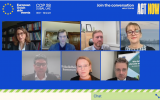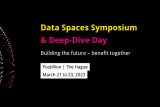Highlights from the Intelligent Cities Challenge Implementation Lab

From March 4 to April 5, Amsterdam Smart City (ASC) collaborated with international peers from 77 cities across Europe in a series of online knowledge and inspiration sessions during the Intelligent Cities Challenge (ICC) Implementation Lab. The focus was on sharing best practices and building knowledge for implementing Local Green Deals (LGDs) to accelerate the transformation towards sustainability based on the principles of good governance, policy integration, partnership with local stakeholders.
Colleagues, partners, and experts from the Amsterdam Smart City network shared insights in several thematic and training sessions, including:
• Mobility & Transport Thematic Session: Pelle Menke shared the approach and lessons from ASC's Mobility Justice Challenge, while Diederik Basta introduced the City of Amsterdam's participation in the Gemini project, supporting residents in starting local, shared mobility cooperatives through a "Mobility as a Commons" (MaaC) approach.
• Local Green Deals Training Session: Egon van Wees presented Amsterdam's experience in setting up nine Impact Deals with social enterprises under the CLIMAA Local Green Deals project. The evaluation indicates that these deals have resulted in the creation of 105 jobs for people with barriers to the labor market and a reduction of 92 tonnes of CO2 emissions. Amsterdam, in collaboration with Aalborg (Denmark), also developed a framework now utilized by other cities in setting up similar Impact Deals.
• Social Economy Thematic Session: Frits Verhoef shared lessons from his involvement in two local energy cooperatives, including the pioneering work of NDSM-Energie in developing a 15MW wind park in the NoorderIJplas area, highlighting various financial and political barriers yet to be overcome. Frits also his work with MeerEnergie, a cooperative aiming to establish a heating network owned by local residents in the Watergraafsmeer district of Amsterdam, utilizing waste heat from nearby data centers.
What's Next?
Amsterdam Smart City is excited to host the ICC network in Amsterdam for a Mobility Field Visit in May, showcasing best practices for public-private collaboration in sustainable and smart mobility. We also look forward to connecting with ICC peers in person during the upcoming ICC conference in Porto in June.
More Information
For further details about the Implementation Lab and upcoming ICC activities, visit the ICC website: https://www.intelligentcitieschallenge.eu/events/icc-implementation-lab-1
Stakeholders in the Amsterdam Region interested in more information or wishing to connect to the ICC network during upcoming labs or other similar sessions can reach out to ASC International Liaison via cornelia@amsterdamsmartcity.com






